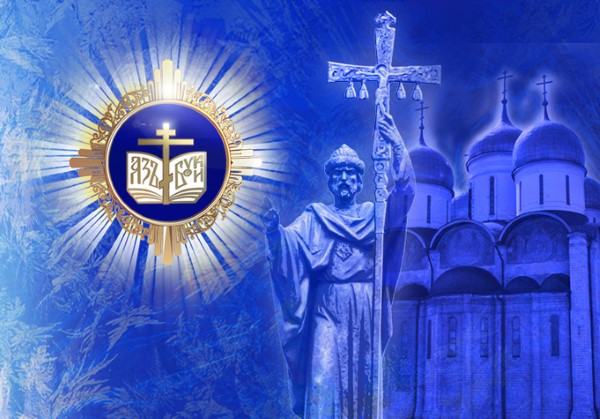On Tatiana’s Day, the Moscow State University, the People’s University of Russia, the Federation Council and the Cathedral of Christ the Savior—the most notable of the forum’s sponsors—will host the 24th International Christmas Readings. This time, the Christmas Readings will bring together a record number of people—over 17,000 guests from 18 countries.
The topic chosen for the Christmas Readings in 2016 is as polemical as ever: “Traditions and Innovations; Culture, Community, Individuality.”
“There is a stereotype that the church endorses nothing but traditions, which means it’s against innovations,” Vladimir Legoyda, chairman of the Russian Orthodox Church’s Synodal Department for Public Relations and Media, said in his speech at a Moscow press conference on 21 January. “The Christmas Readings have a goal to, among others, debunk that stereotype. The church endorses innovations that preserve and follow up on the root traditions. I’ll use an example to be more precise. One can receive a ‘like’ and a handshake. Both of them are forms of greeting. The church endorses both, but real-life communication is our priority. We are traditionalist that way. We are not conservatives or liberals—those are the constants of the political reality that is part of the religious community as well; we are traditionalist in terms of culture.”
Vladimir Legoyda says that, with the world becoming increasingly virtualized, the Christmas Readings are changing and using virtualization as a tool for promoting real-life communication: nearly all lectures and discussions will be broadcast online, on
Patriarchia.ru and the website of the
24th International Christmas Readings.
The forum will open on Tatiana’s Day, 25 January, at the Cathedral of Christ the Savior. Metropolitan Mercurius of Rostov and Novocherkassk believes the date is symbolic, as the forum is mostly aimed at students and young scientists. Two platforms at once—MSU and PFUR—will host the lectures entitled “Spiritual and Moral Culture and Religious Tolerance in Universities” and “What Comes First: Nurture or Education?” prior to the official opening ceremony.
Governors and members of regional parliaments are also interested in this year’s Christmas Readings, since their main sessions will take place at the Federation Council. This year’s main topics are “Russia and Mount Athos: The 1,000th Anniversary of Russian Monkhood on the Holy Mountain,” “Church and Society; Interreligious Cooperation” and “Nurture and Education: Moral and Spiritual Aspects.”
“We take turns with our colleagues from State Duma when we host the readings,” says Zinaida Dragunkina, chairperson of the Federation Council Committee for Science, Education, Culture and Information Policy. “This year, the readings take place at the Senate. And I think our debates will go beyond the ways of reconciling traditions and innovations. To reach that goal, we should first learn to understand both our own culture and other cultures and religions. I believe and I advocate that belief before different audiences and agencies: nothing but the ‘three sisters’ of nurture, education and culture can help people develop in a harmonious way without pitting traditions against innovations. This is why the ‘three sisters’ should go hand in hand and complement each other. And we should facilitate that tricky process.”
Metropolitan Mercurius elaborated on her idea, stressing that the overarching theme of the 2016 Christmas Readings would be the combination of nurture and education. He added that the 24th Christmas Readings would systematically “confront—on an intellectual, civil and ideological level—a number of present educational reforms aimed at dividing nurture from education.”
Since combining nurture and education is a rather ambitious goal in an era of innovation, the Christmas Readings are changing. Although the 2016 Christmas Readings are organized by the Russian Orthodox Church, they will be attended by representatives of all of Russia’s traditional religions. In addition to CIS member nations, Georgia and the Baltic states, guests from the United Kingdom, Switzerland, Germany and Greece will attend. For the first time in history, the lectures—both for students and parliamentarians—will be accompanied by a premiere screening of Vladimir Grammatikov’s film The Summer of the Lord adapted from Ivan Shmelyov’s eponymous novella.
“I will not tell you all of our secrets,” Metropolitan Mercurius, head of the organizing committee of the International Christmas Readings, said at the press conference, “but let's say the forum will turn 25 years old next year, so we’ll have an anniversary. And the Christmas Readings will keep changing and reformatting in order to find an even bigger audience.”
According to the officials of the Russian Orthodox Church’s Synodal Department for Public Relations and Media, their main goal is to promote the Christmas Readings among youth. Which means that the Christmas Readings will soon come to social networks. The process has already started in several regions—in Stavropol, Siberia and the Urals. The outcomes of the 2014–2015 experiment were unexpected and quite encouraging, as thanks in part to social networks over 10 million people, almost 40 percent of them young, took part in the regional stages of the 2015 Christmas Readings.








